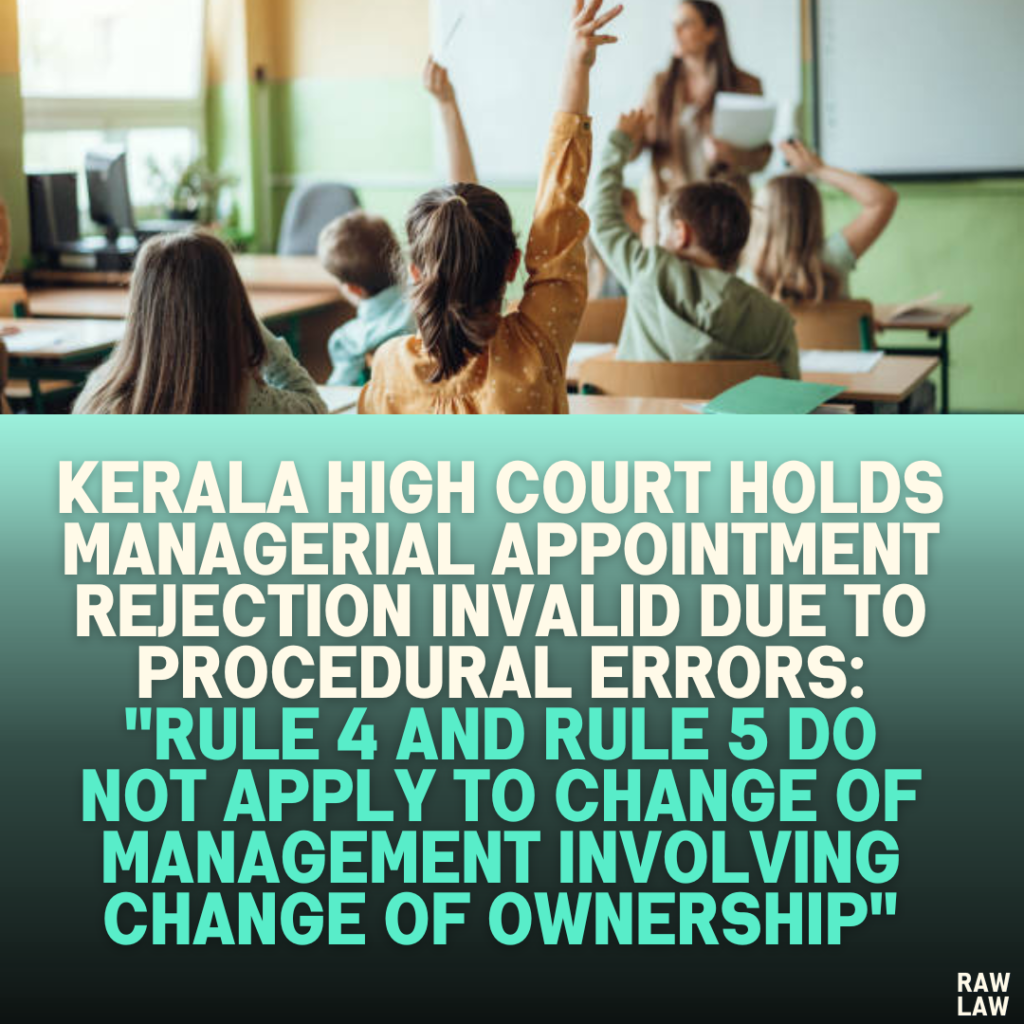Court’s Decision
The Kerala High Court quashed the orders issued by the Assistant Educational Officer, the Additional Director of Education, and the Government (Exts. P6(a), P8, and P9) that rejected the petitioners’ application for managerial approval of a school. The Court found that the authorities acted on flawed interpretations of the Kerala Education Rules (KER) and disregarded critical evidence. It directed the authorities to reassess the petitioners’ application in light of the correct legal principles.
Facts
- Ownership of School: The first petitioner purchased a Lower Primary School in 2010 from its previous owner, and the transaction was approved by the Director of Public Instructions (DPI) in 2014 through Ext.P1.
- Managerial Changes:
- Initially, the first petitioner sought approval to become the Manager.
- Later, she nominated the second petitioner as the Manager due to ongoing legal challenges.
- Rejection of Applications:
- The authorities rejected the managerial nomination, citing procedural violations and stating that the management transfer was not approved.
- Additional respondents (teachers of the school) opposed the petitioners, raising concerns about staff interests and property possession by the Manager.
- Legal History:
- The managerial approval was contested by teachers through W.P.(C) No. 8393 of 2014, leading to an interim stay and subsequent directions to consider the petitioners’ applications.
- Despite clear approval of the ownership transfer in Ext.P1, the authorities rejected the managerial appointment based on misapplied rules.
Issues
- Did the rejection of the second petitioner’s managerial appointment comply with the Kerala Education Rules (KER)?
- Were the authorities justified in their interpretation that the Manager must possess ownership of school properties?
Petitioner’s Arguments
- Approval of Ownership Transfer: Ext.P1 clearly approved the ownership transfer to the first petitioner, invalidating the argument that the transfer was not recognized.
- No Mandatory Link Between Ownership and Management:
- The KER and the Kerala Education Act allow Managers to be distinct from owners.
- Rules 4 and 5, relied upon by the authorities, do not apply to changes involving ownership transfer.
- Misapplication of Rules:
- Rule 5A of Chapter III of KER requires approval only for changes in management involving ownership transfer, which had already been satisfied.
- Rule 3(2), regarding property possession, was not mandatory and did not preclude the appointment of non-owners as Managers.
Respondent’s Arguments
- Possession of Properties: The authorities claimed that Rule 3(2) required the Manager to possess the school’s properties, which the petitioners failed to demonstrate.
- Adverse Impact on Teachers: The additional respondents argued that the managerial changes would affect their legal rights and the stability of school management.
Analysis of the Law
- Rule 5 of Chapter III of KER:
- Requires reporting and approval for changes in management.
- However, as per the Note to Rule 5, it does not apply to changes involving ownership transfers.
- Rule 3(2) of Chapter III of KER:
- Provides that Managers “may” possess the school’s properties but does not mandate it.
- The use of “may” implies discretion, not compulsion.
- Section 7(1) of the Kerala Education Act, 1958:
- Permits educational agencies to appoint any person as Manager, subject to approval by the Government-authorized officer.
- Judgment in Koyyode Madrassa U.P. School:
- Reinforced that prior permission is not required for transfers of running schools with management.
- Managerial changes do not necessitate compliance with Rule 5A at the stage of running school transfers.
Precedent Analysis
The Court referred to Koyyode Madrassa U.P. School v. Director of Public Instructions (2011), which outlined the following:
- Approval for managerial changes applies only to changes involving ownership.
- The approval process can occur after the actual transfer of a running school.
- The authorities’ reliance on Rule 5A for rejecting managerial changes was misplaced.
The petitioners also cited Kesava Kurup v. State of Kerala (1988) to argue that no adverse effects on staff arose from the managerial changes.
Court’s Reasoning
- Ownership Transfer Approved: The Court highlighted Ext.P1, which clearly approved the transfer of ownership in favor of the first petitioner. Authorities ignored this approval while rejecting managerial changes.
- Misapplication of Rules:
- Rule 5 and Rule 3(2) were misinterpreted to justify the rejection of the second petitioner’s appointment.
- The statutory framework does not require ownership and management to be held by the same individual.
- Errors in Administrative Orders:
- Ext.P6(a), P8, and P9 relied on flawed reasoning and contradicted existing approvals and legal principles.
- The authorities’ decisions were arbitrary and procedurally defective.
Conclusion
The Court invalidated the rejection orders and directed the authorities to reconsider the managerial application based on the correct interpretation of KER and the Kerala Education Act.
Implications
- Managerial Flexibility: The judgment underscores that ownership and managerial roles in aided schools can be distinct, provided statutory requirements are met.
- Administrative Accountability: Educational authorities must adhere to procedural correctness and statutory interpretations when deciding on approvals.
- Precedential Value: Reaffirms the binding nature of prior judicial interpretations of Rule 5 and Rule 3(2) in managerial disputes.
